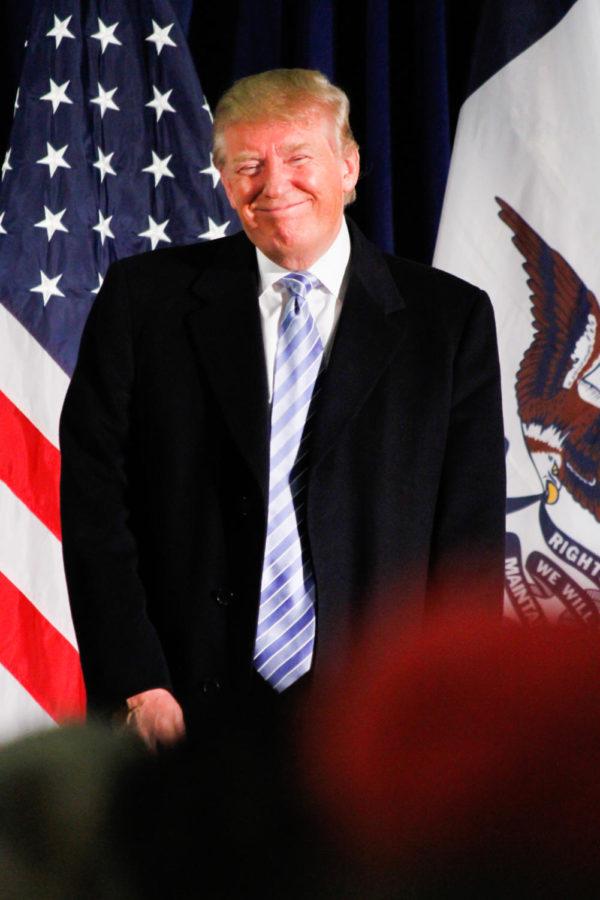Salo: Why did Trump leave the Paris Agreement?
Republican presidential hopeful Donald Trump speaks in front of a crowd on Jan. 19 at the Hansen Agriculture Student Learning Center. Trump talked about economic and healthcare reforms. At the rally he was endorsed by former governor of Alaska, Sarah Palin.
June 2, 2017
The media exploded on Thursday after President Trump announced that he was pulling the United States out of the Paris Climate Accord.
The pact, which was agreed upon by 196 countries on December 12, 2015 went into effect on November 4, 2016.
The mission of this pact was to limit the global average temperature increase to no more than 3.6 degrees fahrenheit higher than the pre-industrial era (1850-1900).
In order to do this, the participating countries vowed to focus on green energy sources, cut down on greenhouse gas emissions and limit the rise of global temperature. Every country also had their own plan on how to achieve the goals outlined in the agreement and the more wealthy developed countries would provide $100 billion annually for underdeveloped countries working towards controlling the climate.
During his campaign, Trump promised American voters that if he became president, he would “cancel” the Paris agreement. And now he has kept that promise. In his speech on Thursday, Trump said:
“One by one, we are keeping the promises I made to the American people during my campaign for President –- whether it’s cutting job-killing regulations; appointing and confirming a tremendous Supreme Court justice; putting in place tough new ethics rules; achieving a record reduction in illegal immigration on our southern border; or bringing jobs, plants, and factories back into the United States at numbers which no one until this point thought even possible. And believe me, we’ve just begun. The fruits of our labor will be seen very shortly even more so.”
He said that he is now looking into renegotiating the terms of the agreement to make it more fair for the US.
But negotiation may not be an option. Leaders of France, Germany and Italy told Time that they saw the agreement as “a cornerstone in the cooperation between our countries, for effectively and timely tackling climate change.”
By leaving the agreement, Trump has weakened the connection that the U.S. has between foreign countries, making it less likely that they will be willing to renegotiate.
Not only will renegotiation not be likely, it may be impossible.
Pulling out of this deal with the intention of renegotiating is like quitting your job then telling your boss that you want to talk about a raise. It’s backwards.
In my opinion, Trump pulled out of the Paris Agreement because he said he was going to and he hasn’t had a great track record so far of keeping his word. He definitely didn’t leave the agreement based on facts, since the New York Times debunked his statements of reasoning.
It doesn’t matter what bridges he burns with other countries or what damage could possibly happen to the Earth because of this decision, as long as his conscious is clear because he kept his promise – everything’s fine. Right?
But why would Trump fight for something that he doesn’t believe in?
In 2012 he tweeted that he believed that climate change was a hoax.
The concept of global warming was created by and for the Chinese in order to make U.S. manufacturing non-competitive.
— Donald J. Trump (@realDonaldTrump) November 6, 2012
And now, after he has pulled out of the agreement, we still can’t be sure what his beliefs are:
Asked if Trump still thinks climate change is a hoax, @PressSec Spicer says: “I have not had an opportunity to have that discussion” pic.twitter.com/1U0X8zn9sh
— POLITICO (@politico) June 2, 2017
Because, no matter what his personal beliefs are, he is the leader of our country. As our leader, making decisions that will impact all of us, he needs to take into account what America wants – not just what he wants. And what America wanted, was to stay in the Paris Agreement.
This was not about Pittsburgh or Paris – this was personal.






